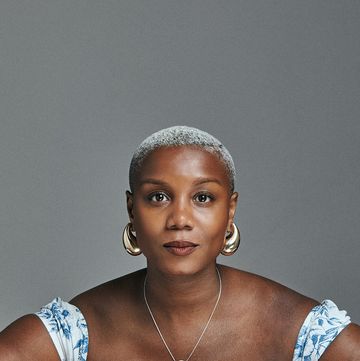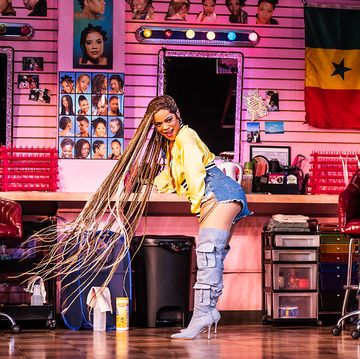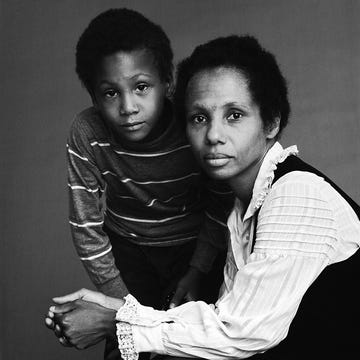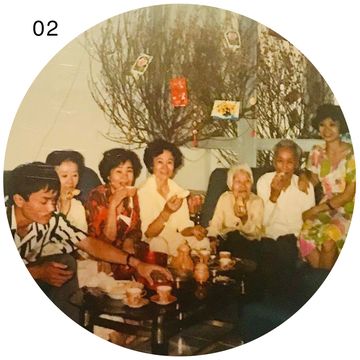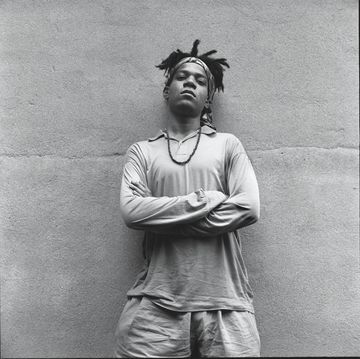Alongside the debris and muck they stir up, storms have an incredible power to bring a lot of emotions to the forefront. In my case, Hurricane Ida, a Category 4 storm that made landfall in southeastern Louisiana in late August 2021, conjured up a lot of nostalgia.
I had evacuated ahead of the storm, but when I drove back a few days afterward to assess the damage of my home and check on aging neighbors, it set in that this kind of climate-change-driven anxiety was our new norm. I spent some time mourning. It felt like too much to deal with. I wanted nothing more than to return to a time when I was either too young to fully comprehend the dangers our planet faces, or before we allowed this nation’s leadership to ridicule the science we should’ve listened to decades ago.
So, I took myself there. First on the coattails of Luther Vandross’s “Never Too Much.” It made me want to dance the way Mother and I used to on weekend afternoons, when she’d open the windows on crisp breezy days in particular, back when our seasons made sense, and play the classics, the ones that felt good to your soul. As I motored in my white station wagon across two-lane highways and over seemingly endless bridges spanning marsh and swampland, those memories propelled me. It was a natural transition into Stevie Wonder’s Songs in the Key of Life, a two-disc album once permanently housed inside my mom’s pride and joy: a six-disc CD changer that sat atop our wooden entertainment stand like an altar. As palm trees on the Gulf Coast turned into prolific pine tree forests as I got further into Mississippi, I turned on the album’s opening track, “Love’s in Need of Love Today.” Wonder introduces himself as the “friendly announcer” who has news for everybody. “What I’m about to say,” he continues, “Could mean the world’s disaster.”
Disaster. My brain got stuck right there. Did he mean “world’s disaster” as in the one climate scientists have been warning against? Disaster. Akin to the one whose aftermath I’d just witnessed driving through Louisiana? It was possible. Two tracks later, “Village Ghetto Land” illustrates socioeconomic-driven perils of the inner city: broken glass everywhere, blight, low access to food, and an infant mortality crisis. All documented signs of environmental racism. On the B side, “As,” my mother’s favorite song, chronicles Wonder’s promises to always demonstrate his love, using examples from nature to make his point. His love would last "until the rainbow burns the stars out in the sky / Until the ocean covers every mountain high / Until the dolphin flies and parrots live at sea." Or "until the day is night and night becomes the day / Until the trees and seas just up and fly away."
Although the bridge is mostly an exaggerated list to illustrate the strength and longevity of his affection, what I had once found silly, and even mythical as a child, gave me pause on this post-hurricane drive. I heard Wonder envisioning life with his beloved only up until “dear Mother Nature says her work is through,” which felt like a nod to the then-forming environmental justice movement.
In “Saturn,” Wonder is even more direct. "Packing my bags—going away / To a place where the air is clean / On Saturn / There's no sense to sit and watch the people die."
Black popular music has always been political. Looking at the decades surrounding the civil rights movement, it was not uncommon for Black artists to champion social causes in their music, and many of the leading soul singers of the era, like Mahalia Jackson, were part of the movement themselves.
Funk came to be around the same time, with James Brown’s release of “Papa’s Got a Brand New Bag” in 1965. Three years later, he released what became an anthem used in racial justice movements for decades: “Say It Loud – I'm Black and I'm Proud.” He took soul music, which came alive in the 1960s especially with the establishment of Motown Records, to the dance floor.
Meanwhile, environmentalism as a social cause was taking root, blossoming into a full-fledged movement in the '70s and '80s. Environmentalism as a social movement built upon the momentum of the '60s; later, in the courts, the Civil Rights Act would be used to bolster environmental racism suits.
Wonder, whose talents span all genres, including funk and soul, is often credited for his humanitarianism and commitment to justice. However, Black artists like Wonder are less known for having, both subtly and outrightly, included climate change and the importance of protecting the planet and our shared environs in their music, despite being contemporaries of the environmental justice movement. Part of that may have to do with the prevailing, white-centered image of long-haired hippies, folk singers as prototypical “tree huggers.”
Still, Marvin Gaye, one of the most notable soul singers of all time, also crooned a clear climate change ballad in “Mercy Mercy Me (The Ecology)”—although the parenthetical insert in the song’s title is often left out, forgotten. Gaye illustrates a changed world. “Where did all the blue skies go?” he asks before bemoaning, “Poison is the wind,” the oil spilling into the ocean and seas, and radiation killing animals and birds. And perhaps the most pivotal question comes in the final verse: “What about this overcrowded land? / How much more abuse from man can she stand?”
The few words in Funkadelic’s “Maggot Brain” lament how humans have mistreated the planet: “Mother Earth is pregnant for the third time,” George Clinton, the band’s leader and one of funk’s most influential artists, utters in the intro. “For y’all have knocked her up.”
“Storm Music” opens Gil Scott-Heron’s 1981 album, Reflections. The jazz-funk fusion artist known for blunt political commentary in his music created an anthem with a double entendre, referencing both literal storms and a figurative one brought on by the waves of Pan-African solidarity ("The storm is comin', it grows on the waves / From Johannesburg to Montego Bay").
I don’t know if I’ll ever listen to Earth, Wind & Fire the same. I blasted the band and my air conditioning at maximum capacity, a balm for my stress and the sweltering summer heat, respectively. If the land called “Fantasy” is one of liberty, victory, and ecstasy, it must be one we’ve protected from Big Oil and other serial pollutants that have contributed to so many of the world’s disasters, like the ones Wonder warns about. Wonder, like his contemporaries, also warn about what would happen if we destroyed love.
Wonder’s pronouncement in “Love’s in Need of Love Today” that gave me pause on my post-storm drive was that the world lacked so much love that love itself was in need of it. The revelation alone could destroy people’s joy and laughter, and transform it into tears and pain, Wonder sings.
Of course, as much soul music, and funk in particular, is about desire, sex, passion, a lot of the genre’s songs are love ballads, many of which include lyrics about nature and the elements—fire, morning sun, blue skies—as imagery, love personified.
Comparing a love interest to the beauty within the natural world marked a compliment of the highest degree. Funk and soul artists marked nature as precious, worth preserving, like the way falling in love can make you wish you could slow down time, bottle it up. Except funk and soul music were not about restraint or borders by any means. The two genres ushered in a new style, a freer, less rigid way of expression in terms of sound, but also the fashions and dances that emerged in the culture. Gone are latent lyrics that are coy about sex, drugs, and pleasure; instead, funk and soul mirror the wild freedom of an overgrown meadow, the kind that thrives when humans don’t interfere, pillage, destroy.
So what happens as we kill our planet? As we ramp up deforestation, pollute water sources, drill until coastlines disappear, that reverence, respect, that love driving some of the best music of all time is gone too.
When it comes to climate change, we’ve long expired our friendly warnings; we’re living the consequences of that now. But Wonder also promises that it isn’t too late to intervene, take precautionary measures against the “hate goin’ round,” so long as everyone sends in their love right away—“Don’t delay,” he urges.
I can only hope we listen.






